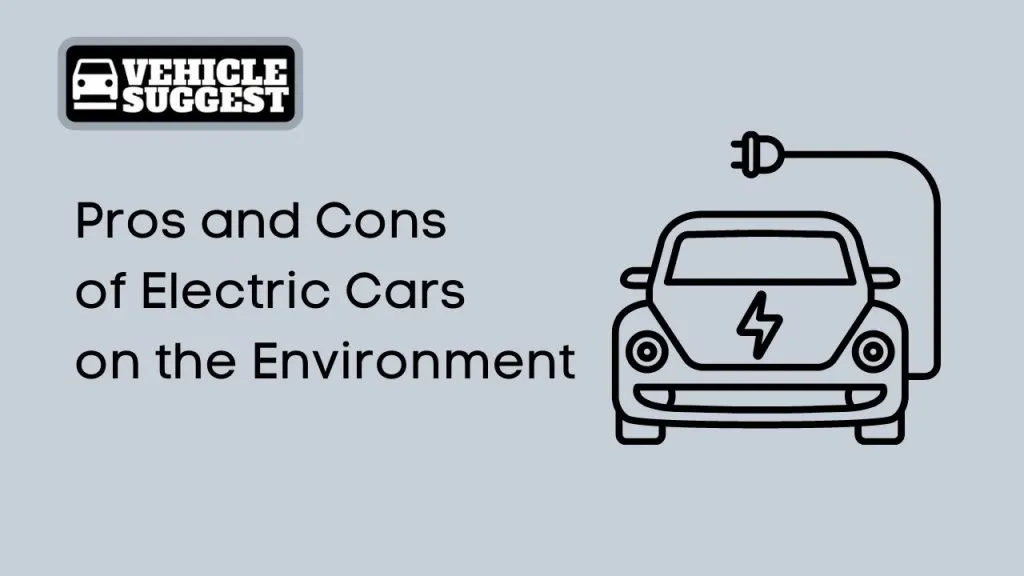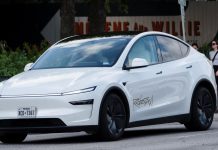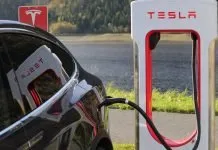Electric cars are becoming more and more popular each year. More people are making the switch to electric vehicles because of their many advantages, but there are also some disadvantages to consider. In this blog post, we will take a look at the pros and cons of electric cars on the environment. We will discuss the benefits of electric cars as well as the drawbacks, and you can decide for yourself if they are right for you!

Table of Contents
Disadvantages of electric cars on the environment
While electric cars are often hailed as being more environmentally friendly than their gas-powered counterparts, they actually have a number of disadvantages when it comes to their impact on the environment. Let’s look at some of those:
The manufacturing process of electric cars emits toxins that harm the environment
Electric cars are often lauded as being more environmentally friendly than traditional gasoline-powered cars. However, the manufacturing process of electric cars can actually have a negative impact on the environment. The batteries that power electric cars contain a number of toxic chemicals, including lead and cadmium. When these batteries are produced, these toxins can be released into the air, water, and soil. Additionally, electric cars typically require more rare metals and minerals than gasoline-powered cars, which can lead to increased mining and deforestation. As a result, although electric cars may produce fewer emissions than gasoline-powered cars, their manufacturing process can still cause harm to the environment.
Electric cars run on electricity, which is produced by burning coal and other dirty fuels
Electric cars are often lauded as being more environmentally friendly than traditional gasoline-powered cars. After all, electric cars produce zero emissions, and they run on electricity, which can be generated from renewable sources like solar and wind power. However, there is a dark side to electric cars that is often overlooked. Electric cars run on electricity, which is produced by burning coal and other dirty fuels. In fact, electric cars could be worse for the environment than gasoline-powered cars when the entire life cycle is considered. From manufacturing to disposal, electric cars generate more greenhouse gas emissions than gasoline-powered cars. As a result, electric cars are not the green vehicles they are often made out to be.
The batteries in electric cars contain harmful chemicals that can leak into the ground and water supply
While electric cars have many advantages over traditional gas-powered vehicles, they also have some potential drawbacks. One of the most significant environmental concerns is the fact that the batteries in electric cars contain harmful chemicals that can leak into the ground and water supply. In particular, the lead and acid in car batteries can pose a serious threat to human health and wildlife. In addition, electric car batteries are generally not recycled, which means that they end up in landfills where they can release harmful toxins into the air and soil. As a result, it is important to weigh the pros and cons of electric cars before making a decision about whether or not to purchase one.
Advantages of electric cars on the environment
Electric cars have been on the rise in recent years, and for good reason. They offer many advantages over gas-powered cars when it comes to the environment. Here are just a few of the benefits of electric cars:
Electric cars are more environmentally friendly than gas cars, emitting zero emissions
Electric cars are becoming increasingly popular as consumers look for more environmentally friendly transportation options. One of the main benefits of electric cars is that they emit zero emissions, making them much better for the environment than gas cars. Electric cars also tend to be more efficient than gas cars, so they use less energy and produce fewer greenhouse gases. In addition, electric cars often have lower maintenance costs than gas cars, so they can save you money in the long run. Overall, electric cars offer a number of advantages over gas cars, making them an attractive option for those who are looking to reduce their impact on the environment.
They help reduce our dependence on oil, which is bad for the environment
One of the main advantages of electric cars is that they can help reduce our dependence on oil. Oil is a non-renewable resource, which means that it cannot be replenished once it has been used up. This is bad for the environment in two ways. First, it means that we are slowly running out of oil, and second, the production of oil creates a lot of pollution. Electric cars do not use oil, so they can help to reduce our reliance on this damaging resource. In addition, electric cars are much more efficient than gasoline cars, meaning that they produce fewer emissions. This is good for the environment in both the short and long term. As more people switch to electric cars, we can expect to see a decrease in the amount of pollution caused by cars.
They’re easier to maintain and have fewer parts that can break down
Electric cars have a lot of advantages over traditional gasoline-powered vehicles. One of the biggest benefits is that they’re much easier to maintain. Electric cars have far fewer parts than gas cars, and those parts are less likely to break down. Electric cars also don’t require tune-ups or oil changes, and their brakes last longer because they regenerate energy when you slow down. As a result, electric car owners save a lot of money on maintenance and repairs over the life of their vehicles. And when something does go wrong, it’s usually covered by the car’s warranty. So if you’re looking for a car that’s easy to take care of, an electric car is a great option.
Frequently asked questions about the environmental impact of electric cars
How do electric cars pollute the air?
Electric cars definitely don’t produce emissions from the tail pipe, but the electricity that powers them often does. Electric cars can still produce emissions from the power plant that creates electricity. Some power plants use coal to generate electricity, and coal-burning produces a number of harmful emissions like sulfur dioxide and nitrogen oxide. These pollutants can cause respiratory problems, heart disease, and other health issues.
What is the biggest problem with electric cars?
The biggest environmental problem with electric cars is the manufacturing process of their batteries. Lithium-ion batteries, which are the most commonly used type of battery in electric cars, can have a significant impact on the environment if they’re not produced properly. The mining and refining of lithium requires a lot of energy and water, and can release harmful chemicals into the air and water if done incorrectly. In addition, disposing of old lithium-ion
How bad is lithium for the environment?
Lithium is bad for the environment because it’s a very dense metal and when it leaks into water, it can contaminate the water supply with toxic levels of lithium. It’s important to properly dispose of lithium batteries because if they’re not disposed of properly, they can leak acid that can contaminate water supplies. So it’s important to recycle your batteries and to make sure that you don’t throw them in the trash or down the drain.
Is electricity eco-friendly?
There is no definitive answer to this question. Some forms of renewable energy, such as solar and wind power, are considered environmentally friendly because they don’t produce emissions that contribute to climate change. However, electricity generated from fossil fuels is traditionally considered less environmentally friendly than renewables.
How do cars harm the environment?
Cars have many negative effects on the environment. Greenhouse gas emissions from cars are the biggest cause of climate change. These emissions contribute to global warming, which harms the environment in many ways. Air pollution from cars is another huge problem. Smog and other airborne pollutants created by cars cause respiratory problems and lead to a host of other health problems. Air pollution also contributes to climate change.
Cars also consume a lot of resources such as oil. Currently, most cars are powered by fossil fuels that are non-renewable. This means that eventually, we will run out of these resources unless we find substitutes or switch to alternative energy sources. Fossil fuel burning also emits air pollutants and greenhouse gases.
Do electric cars have a future?
Electric cars certainly have a future. They are becoming more and more popular, and the technology is continuously improving. More and more countries are also investing in infrastructure to support electric cars. So I think it’s safe to say that electric cars definitely have a bright future ahead!
The electric car has pros and cons on the environment. Although they produce zero emissions, the manufacturing of electric cars and batteries uses many resources and creates a lot of waste. If more people adopt electric cars, it could have a large impact on the environment. Electric cars are definitely a step in the right direction for reducing our carbon footprint, but we need to be mindful of all the impacts they have before we make them mainstream.
Final Verdict
Electric vehicles are becoming more popular, but there are still some concerns about their environmental impact. One big advantage of electric cars is that they produce zero emissions, which is great for the environment. However, the manufacture and disposal of electric car batteries can have a negative effect on the planet. Another issue is that the electrical grid still relies heavily on fossil fuels, so charging electric cars can indirectly create pollution. Thankfully, there are programs like EV charging grants that help offset some of these environmental impacts.



















Lithium is actually the least dense metal. This article claims lithium is “a very dense metal”, which is spectacularly wrong. In fact almost every negative “fact” about electric vehicles presented in this article is totally and spectacularly wrong.